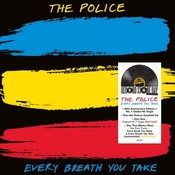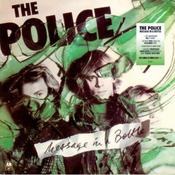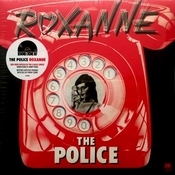King Of Pain, 12''
Soundbites
One of the classic late period Police songs from the 'Synchronicity' album, 'King of Pain' was released as a single in early 1994, reaching #17 in the UK and #3 in the States. This was actually the final single released by the Police whilst they were still together. One of the small band of Police tracks that occasionally gets dusted off and played by Sting in concert, for example on the 1991 and 1993 tours. A live solo version of the song recorded in Holland in 1991 can be found on the 'Fields of Gold' single. 'Tea In The Sahara' appears on the 1983 Police album, 'Synchronicity' and a live Police version appears as the B-side to this single. Based on a Paul Bowles story ('The Sheltering Sky'), the track was a popular inclusion in the Police's live set, and one of Sting's favourite songs although he is said to have thought The Police played it too fast. Not too surprising then to see the song included in the set list for his first solo tour in 1985. A live version from that tour recorded in Arnhem can be found on the 'Bring On The Night' album. Also worth looking out for is the acoustic version he played on MTV's 'Unplugged' session in 1991 and which was released a s bonus track on the 1993's 'If I Ever Lose My Faith In You' CD single.
"In 'King Of Pain', I conjured up symbols of pain and related them to my soul. A black spot on the sun struck me as being a very painful image, and I felt that was my soul up there on there on the sun. It's just projecting your state into the world of symbolism, which is what poetry's all about, really."
Sting, Musician, 6/83
"Actually, it was something I said. I'd just left my first wife - a very painful break - and I went to Jamaica to try and pull myself together. I was fortunate to be able to go to Jamaica, I have to say, and stayed at this nice house and was looking at the sun one day. I was with Trudie who is now my current wife and said 'Look, there's a little black spot on the sun today'. And there's a pause. I said, 'That's my soul up there'. I was full of hyperbole. I said that! I went back in and wrote it down on a piece of stuff, and wrote some other stuff."
Sting, 'In The Studio' Radio Show
"It's such a cul-de-sac, that whole culture of pain, and I was being partly ironic. But the thing is, it was written at a time in my life when I was in terrible pain. My first marriage was falling apart. But I don't sing that song anymore. I can't really feel for it now."
Sting, US Magazine, 4/96
Backgrounder
Review from Smash Hits
"Yet another song prised off the 'Synchronicity' LP which is an infuriating mixture of the brilliant and the routine. This one of the brilliant. Sting strings together chilly pictures of people and animals in pain in a voice that sends icicles up your spine. A grower"
Review from No.1
"An eerie little song from the bountiful 'Synchronicity' LP which emphasises the gap between the Police and nearly all their rock/pop contemporaries. Like 'Every Breath You Take', this is simple, very subtle and very classy. Now perhaps Sting and Michael Jackson will get on with some new material."
Review from Record Mirror
"My problem with the Police has been that even though I've liked almost everything they've done - almost! - I've never ever liked it the first or second time I've heard it. The first three times I heard 'Every Breath You Take' I couldn't remember what it was called, or anything about it. At the moment this just sounds like another good Police single, but just how good I'll only be able to judge in about a month's time."
Review from New Musical Express
"I recognise these men. I have already noted 'King Of Pain' as Sting's summit to date, and in 45 form I see no reason to revise that opinion - even though a song that rhymes "reign" with "rain" has a certain idleness in its make up. 'Synchronicity' peaked here some while back and I doubt if this will do that strongly, their live presence notwithstanding. Their Wembley shows were superb tightenings of the set they trailed around America, all the excess showmanship peeled back to an exultant major-league attack. I stick by them."














































